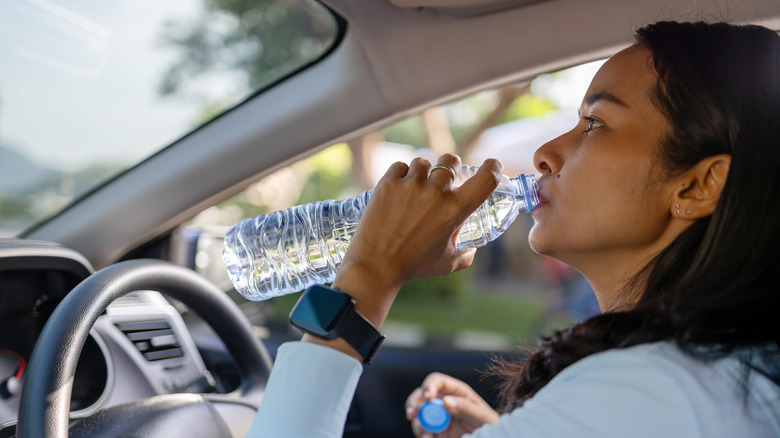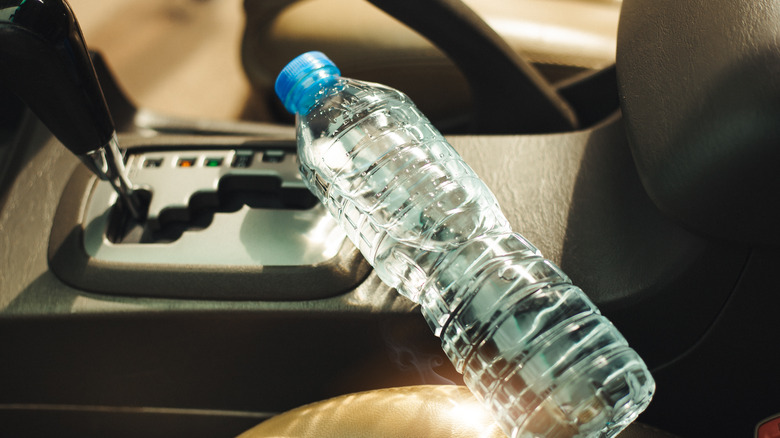This Water Drinking Hazard You've Probably Done On Every Summer Road Trip Is Easily Avoidable
Staying hydrated on a long, hot summer road trip is one of the best things you can do for your health. But what if you left your bottle in the car for a day or two while you went camping, and now you're getting thirsty driving home? Is it still safe to drink? To find out the answer, Islands spoke to Dr. Scott Noorda, DO, IFMCP, a longevity and functional medicine physician at Resolve Medical, and Parker Emerson, personal water wellness expert and co-founder and CEO of the water filtration company Boroux. Unfortunately, both agreed that there are health risks associated with drinking water from plastic bottles that have been left in hot cars. "Heat can cause chemicals like BPA or phthalates to leach from some plastics. These are hormone disruptors linked to health issues," Emerson said.
Exactly how dangerous this is depends on how long the bottle has been sitting in the car, how hot it got, and how often you're drinking from plastic water bottles that have been baking in your backseat. If you're really thirsty, and it's not a regular thing, Dr. Noorda told us that while there are serious risks associated with drinking water bottles that have gotten hot, you may be able to get away with a few sips in an emergency. "A one‑off exposure is highly unlikely to cause noticeable effects, but making it a habit can gradually affect cellular and hormonal health," he advised. "At the end of the day ... staying hydrated is critical and an isolated incident isn't going to be problematic — it's the habits we want to focus on."
Why are water bottles left in the car dangerous to drink from?
If you use a reusable bottle made of glass or stainless steel, you don't have to worry about anything leaching into your water in the heat — though it might grow some nasty bacteria over time if it hasn't been washed since you drank from it. If you're using plastic, though, you may be at risk. Parker Emerson explained exactly what happens when a plastic bottle gets too hot. "The temperature inside the bottle rises, and this heat can cause plastic polymers to break down, releasing trace amounts of chemicals like antimony and phthalates into the water," he told Islands.
Additionally, Dr. Scott Noorda told us that plastic bottles can start degrading and increase your risk of exposure at around 100 degrees Fahrenheit, which, according to the National Weather Service, can happen inside a car in just 25 minutes, even when it's a comfortable 73 degrees Fahrenheit outside. If it's hotter, more chemicals are likely to seep into the water. He added that at 150 degrees Fahrenheit — which your car's interior can hit in just an hour when it's in the 70s outside — bottles can quickly leach chemicals such as antimony, bisphenol A (BPA), and other plasticizers into your water.
What are the risks of drinking from plastic water bottles that have been left in a hot car?
The more often a bottle heats up, the more chemicals are likely to leach into the water. The more often you drink from them, the more likely it is that you're going to experience some adverse effects. While you might be OK finishing off the end of a bottle from yesterday just once, if you bought an entire pack of single-use water bottles for your road trip and left them in the trunk, you're exposing yourself to some potentially harmful chemicals every time you drink from them. Dr. Scott Noorda told Islands, "In clinical practice, I often work with patients dealing with hormonal imbalances, fatigue, or brain fog, and long‑term, repeated exposures to these compounds can certainly play a role. These chemicals can mimic or disrupt hormonal activity and may contribute to systemic issues when combined with other toxin exposures."
The best way to limit your exposure is to avoid drinking from plastic bottles left in a hot car. If you're concerned, you may want to steer clear of single-use plastic bottles altogether (for what it's worth, they're banned in cruises, too), and limit your exposure to heated plastics in general. Dr. Nooda cautioned that everything from water bottles that get too hot in shipping to your shower curtain heating up in the steam every day has the potential of exposing you to harmful chemicals. In a modern world where everything seems to be made of plastic, avoiding it all may seem impossible — but one thing you can control is not drinking from hot water bottles on road trips. It doesn't add that much time to add a pit stop for fresh water.


